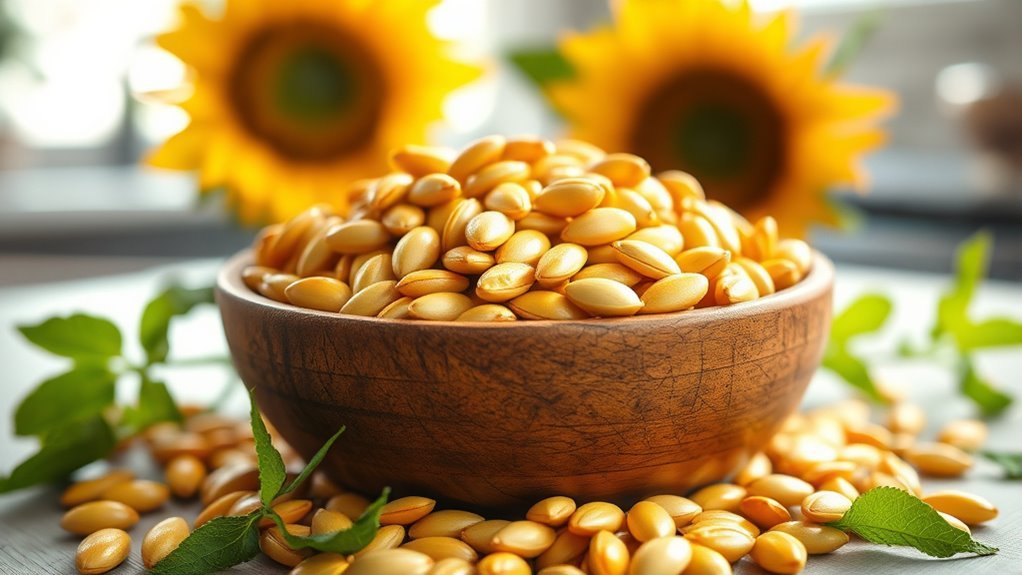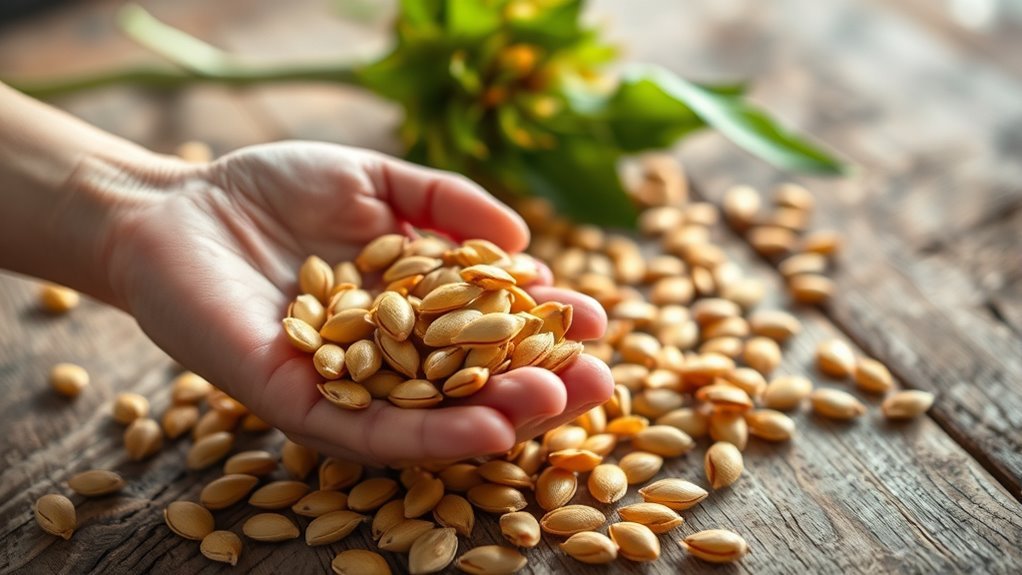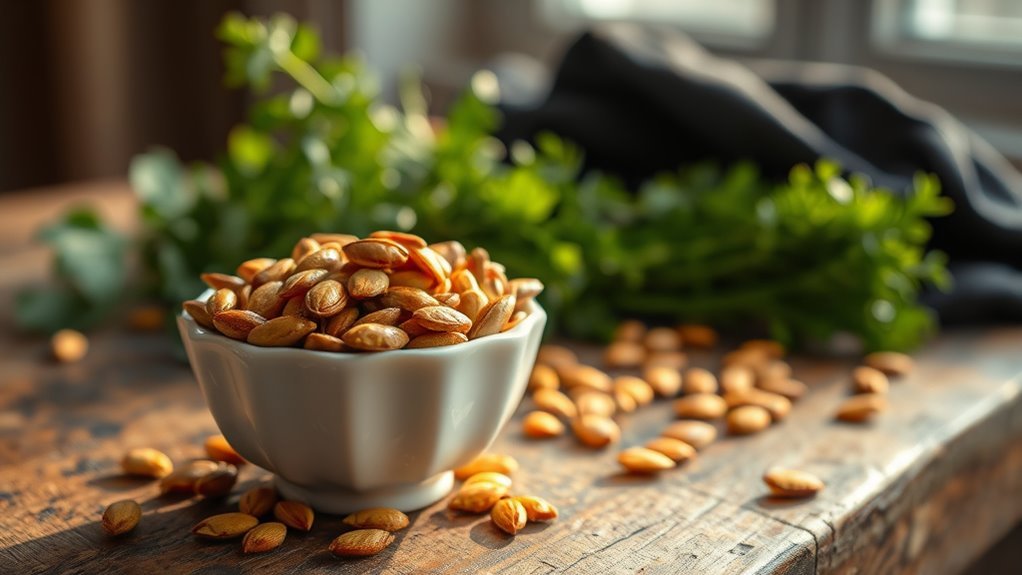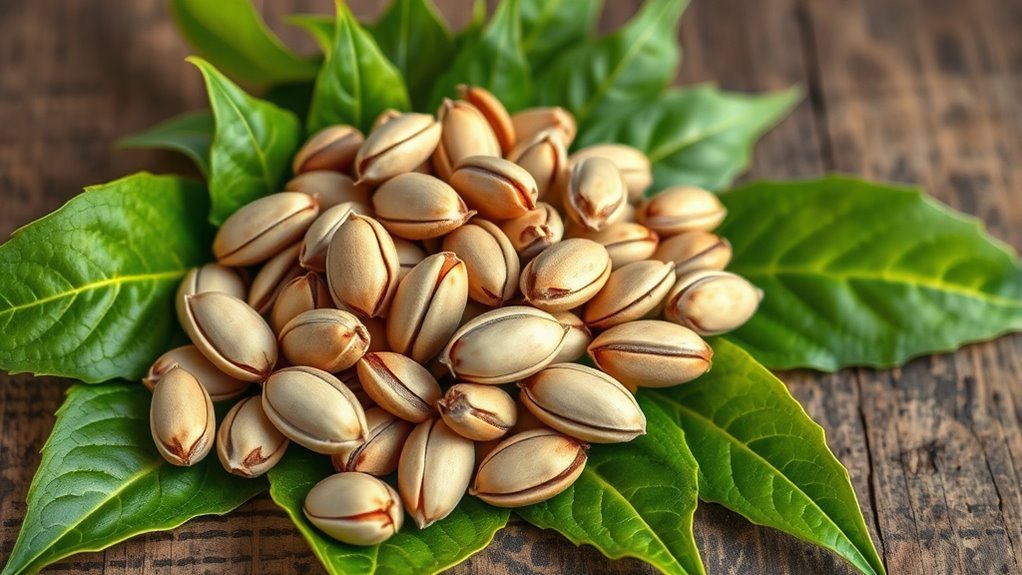Yes, sunflower seeds are keto-friendly! They’re packed with healthy fats, protein, and essential vitamins while keeping carbs low—about 6 grams per ounce. They’re also high in fiber, promoting satiety and aiding digestion. However, portion control is key since they’re calorie-dense. Enjoy them in moderation to stay within your daily macro limits. If you’re curious about how to incorporate them into your meals or their potential drawbacks, there’s a lot more to discover!
Nutritional Profile of Sunflower Seeds

Sunflower seeds are a nutrient-dense snack that can fit well into a ketogenic diet. Packed with healthy fats, they provide you with a satisfying energy source. One ounce of sunflower seeds contains about 14 grams of fat, primarily unsaturated, which supports heart health. Their vitamin content is impressive too; they’re rich in vitamin E, an antioxidant that helps protect your cells from oxidative stress. Additionally, they offer B vitamins like niacin and folate, essential for energy metabolism. With a good balance of protein and fiber, sunflower seeds can keep you feeling full and energized. Including them in your diet not only enhances flavor but also contributes to your overall nutrient density, making them a smart choice for your keto lifestyle.
Carbohydrate Content and Keto Considerations

When it comes to incorporating sunflower seeds into your keto diet, understanding their carbohydrate breakdown is essential. A typical serving contains about 6 grams of carbs, which can add up quickly if you’re not mindful of portion sizes. Keeping track of how much you eat will help you stay within your daily carb limits while enjoying the benefits of these nutritious seeds.
Carbohydrate Breakdown
Although incorporating sunflower seeds into a keto diet can be beneficial, understanding their carbohydrate content is essential for maintaining ketosis. Sunflower seeds primarily contain two types of carbohydrates: sugars and fiber. While the sugar content is minimal, the fiber content is significant, offering about 7 grams per 100 grams, which can help you stay full and aid digestion. When you track your carb intake on a keto diet, it’s vital to account for net carbs, which are total carbs minus fiber. This means you can enjoy sunflower seeds without worrying too much about exceeding your carb limits, as their high fiber content helps offset the total. Just remember, moderation is key to staying in ketosis while enjoying these nutritious seeds.
Portion Control Considerations
While enjoying sunflower seeds as part of your keto diet can be rewarding, it’s important to pay attention to portion sizes to effectively manage carbohydrate intake. Sunflower seeds contain about 6 grams of carbohydrates per ounce, which can add up quickly. To maintain ketosis, consider limiting your serving to a small handful—roughly 1 ounce or 28 grams. This keeps your carb count in check while still allowing you to enjoy their crunchy texture and healthy fats. When snacking, try pairing sunflower seeds with low-carb veggies for a balanced treat. Additionally, measuring out your portions in advance can help you avoid overindulgence. Mindful eating and awareness of serving suggestions can empower you to stay on track with your keto goals.
Health Benefits of Sunflower Seeds

Sunflower seeds are a powerhouse of nutrients that can offer several health benefits, especially for those following a keto diet. Rich in healthy fats, fiber, and protein, they boast impressive nutrient density, making them a satisfying snack. These seeds are high in vitamin E, an antioxidant that supports skin health and may reduce inflammation. Additionally, they contain magnesium, which can help regulate blood pressure and improve muscle function. The healthy fats in sunflower seeds also promote heart health by potentially lowering cholesterol levels. Including them in your diet can aid in satiety, helping you feel fuller for longer. Overall, sunflower seeds can be a valuable addition to your keto lifestyle, providing essential nutrients while keeping your carb intake low.
Portion Control: How Much Is Too Much?
When incorporating sunflower seeds into your keto diet, it’s essential to understand portion control. The recommended serving size is typically around 1 ounce, which contains about 6 grams of carbs. Tracking your daily intake can help you stay within your carb limits while enjoying the benefits of these nutritious seeds.
Recommended Serving Size
Finding the right serving size of sunflower seeds is essential for maintaining a successful keto diet. While they’re a great source of healthy fats and protein, it’s easy to overindulge. Here’s a guideline for your daily intake:
- 1 ounce (about 28 grams): This is the standard serving size, offering roughly 6 grams of carbs.
- 2 ounces (about 56 grams): If you’re feeling particularly hungry, this can be a satisfying portion, but watch your carb count.
- Limit to 3 ounces (about 84 grams): This should be your upper limit, as it can quickly add up in carbs and calories.
Tracking Daily Intake
Tracking your daily intake is essential on a keto diet to guarantee you stay within your carbohydrate limits while enjoying foods like sunflower seeds. These seeds are nutritious, but managing how much you consume is key. A small handful can fit into your daily carb allowance, but it’s easy to overindulge. Daily tracking helps you maintain balance and assures proper intake management. Consider using a food diary or an app to monitor your servings. By doing so, you’ll have the freedom to enjoy sunflower seeds without derailing your keto goals. Remember, moderation is vital—too many seeds can quickly add carbs. So, enjoy them mindfully, and you’ll stay on track while savoring their deliciousness.
Ways to Incorporate Sunflower Seeds Into Your Diet
Incorporating sunflower seeds into your diet can be both simple and delicious, especially since they offer a wealth of nutrients. Here are a few easy ways to enjoy them:
- Snack Ideas: Munch on roasted sunflower seeds for a crunchy, satisfying snack. You can also mix them with your favorite nuts for an energy-boosting trail mix.
- Meal Toppings: Sprinkle sunflower seeds on salads or grain bowls to add texture and flavor. They pair wonderfully with leafy greens and roasted veggies.
- Baking: Add sunflower seeds to your keto-friendly baked goods, like muffins or bread, for extra nutrition and a nutty taste.
Comparing Sunflower Seeds to Other Seeds and Nuts
While sunflower seeds are a popular choice for many health-conscious eaters, it is essential to compare them to other seeds and nuts to understand their unique benefits and potential drawbacks. Sunflower seeds pack a punch in nutrients, offering vitamin E, magnesium, and healthy fats. In a seed comparison, they often stand out for their high protein content, making them an excellent snack for those on a keto diet. However, pumpkin seeds boast even more zinc, while chia seeds provide a higher omega-3 fatty acid profile. Almonds and walnuts, on the other hand, offer additional heart-healthy benefits. By diversifying your diet with various seeds and nuts, you’ll maximize your nutrient intake while enjoying the distinct sunflower seed benefits.
Potential Drawbacks of Sunflower Seeds on Keto
Even with their nutritional benefits, sunflower seeds do have some potential drawbacks for those following a keto diet. Here are a few things to take into account:
Sunflower seeds offer nutritional benefits but come with drawbacks for keto dieters that should be considered.
- Caloric Density: Sunflower seeds are calorie-rich, which can lead to overeating if you’re not careful. It’s easy to consume more calories than intended, potentially sabotaging your keto goals.
- Oxalate Content: These seeds contain oxalates, which may contribute to kidney stone formation in susceptible individuals. If you have a history of kidney issues, moderation is key.
- Carbohydrate Count: While relatively low in carbs, sunflower seeds still have some, and consuming them in large quantities could impact your daily macros.
Being aware of these potential drawbacks can help you enjoy sunflower seeds responsibly on your keto journey.
Recipes Featuring Sunflower Seeds for a Keto Lifestyle
If you’re looking to add variety to your keto meals, sunflower seeds can be a versatile ingredient that enhances both flavor and nutrition. You can whip up some sunflower seed butter for a creamy spread, perfect for your low-carb bread or as a dip for veggies. For a crunchy snack, try making roasted sunflower snacks with your favorite seasonings. If you’re in the mood for something fresh, sunflower seed pesto is a fantastic alternative to traditional basil pesto—just blend seeds with garlic, olive oil, and Parmesan. Finally, consider preparing sunflower seed granola, mixing seeds with unsweetened coconut and spices for a delightful breakfast option that aligns with your keto lifestyle. Enjoy the freedom of experimenting with these delicious recipes!
Are sunflower seeds keto-friendly?
Yes, sunflower seeds are considered keto-friendly. They are low in carbohydrates and high in healthy fats, making them an excellent snack option for those following a ketogenic diet. A 1-ounce serving of sunflower seeds contains approximately 6 grams of carbohydrates, which fits well within the daily carb limit typical for a keto diet.
How many carbs are in sunflower seeds?
In a 1-ounce serving of roasted, unsalted sunflower seeds, there are about 6 grams of total carbohydrates. However, it is essential to note that about 2-3 grams of these carbs come from dietary fiber, which is not counted in net carbs. Therefore, the net carbs would be around 3-4 grams per ounce, making them suitable for a keto diet.
What are the health benefits of sunflower seeds on a keto diet?
Sunflower seeds offer several health benefits for those on a keto diet. They are rich in healthy fats, particularly polyunsaturated and monounsaturated fats, which support heart health. Additionally, they are a good source of vitamin E, magnesium, and selenium, contributing to overall wellness. The fiber content can also aid digestion, which is important when following a low-carb diet.
Can I eat sunflower seeds in moderation while on keto?
Yes, you can enjoy sunflower seeds in moderation while on a keto diet. Due to their relatively low net carb content, they make a great snack option. However, it’s important to keep portion sizes in check as the calories can add up, and overeating can lead to exceeding your daily carb limit. A reasonable serving size is typically around 1 ounce (about 28 grams).
Are there any downsides to consuming sunflower seeds on a keto diet?
While sunflower seeds can be a healthy addition to a keto diet, there are some potential downsides. They are calorie-dense, which means it’s easy to overconsume and exceed your daily caloric needs. Additionally, flavored or salted varieties can contain added sugars or unhealthy fats, which are not keto-friendly. Always check the labels and opt for unsalted, raw, or lightly roasted seeds to maximize health benefits.
References
- https://www.healthline.com/nutrition/are-sunflower-seeds-keto-friendly
- https://www.medicalnewstoday.com/articles/324399
- https://www.ncbi.nlm.nih.gov/pmc/articles/PMC5901722/
- https://www.dietitiansofcanada.ca/resources/foodfacts/sunflowerseeds
- https://www.webmd.com/diet/health-benefits-sunflower-seeds
- https://www.verywellfit.com/sunflower-seeds-nutrition-facts-4110225
- https://www.nutritionvalue.org/sunflower_seeds%2C_dried_nutritional_value.html


